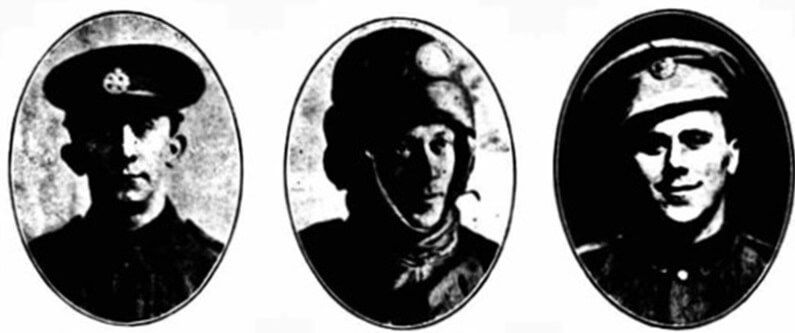by Alison Bailey
In her Scout newsletter The Trail, Miss Porter wrote of a Chesham Bois Scout who was a prisoner of war in Germany and never made it home: “The case of Scout W. Palmer is especially sad; he was taken prisoner early in the war, and died in Germany a few days before the Armistice. Almost the last communication received from him was a card of thanks for a Scout parcel.” Reading this, I immediately wanted to know more. This is his story.
Rifleman William Palmer
William John Palmer enlisted in Watford soon after the outbreak of war, and served with the 2nd Battalion, Rifle Brigade in France from 24 March 1915. His older brothers, Alfred and Edward, had already enlisted.
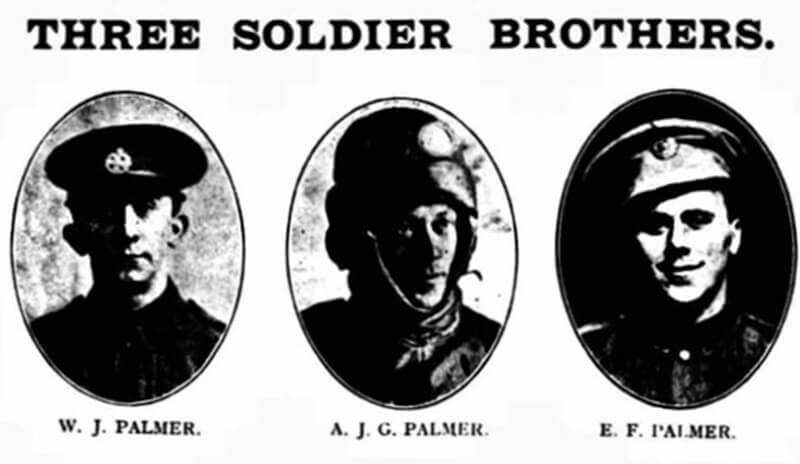
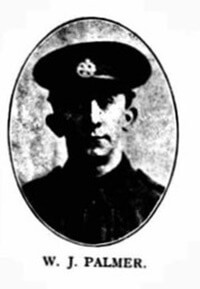
According to an article, dated 9 July 1915, in the local paper, Three Soldier Brothers, Rifleman Palmer “did his little bit cheerfully, and was soon over the water, and his experience of the stern warfare of France was exciting and adventurous, if brief. The meagre information available seems to indicate that he was in an engagement in which the allies suffered, for although he was reported wounded, very little official news could be given of him, and the War Office apparently found Rifleman Palmer’s case one of the hard nuts to crack, as he was not traceable. It was a period of suspense for the lad’s parents, naturally, but recently all their fears as to a fatality were set to rest by the receipt of a letter from their son himself. This shows that he was not only wounded in the arm but that he was also taken prisoner, and the letter was from a Hamburg prisoners’ camp. The detention will no doubt prove irksome, and the lad himself would rather be on active service, but it was a relief to the parents to know that he was safe”.
At the beginning of June 1915, Will’s parents, Alfred and Elizabeth, had received notice that he had been wounded but nothing more was known. They had to wait a further three anxious weeks before receiving a letter from their son. Will wrote “I am writing to you in case you did not receive the other letter I sent from the hospital stating that I was wounded in the arm. I am a prisoner of war. My wound is healing splendidly, thanks to the clever doctors. Remember me to all kind inquirers: tell them I am going on quite all right, and am happy. We are having beautiful weather”.
The Palmers
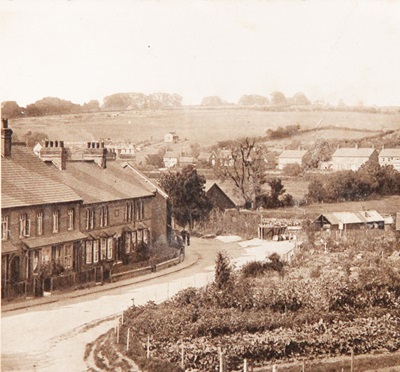
Alfred, born in Ley Hill, and Elizabeth, born in Weston Turville, moved with their three sons from Amersham Common to Bois Moor Road around 1898. Three more sons were born in Chesham Bois (The parish extended to the river Chess until the 1934 boundary change) and a daughter, Henrietta Grace finally arrived in 1906. Alfred supported his family by working as a watercress gatherer. The eldest son, Alfred, trained as an electrical engineer at the Chesham Electric Light and Power Company. The second son, Edward, established a successful landscape gardening company. He was well known locally as a sportsman. A prominent member of the Cestreham Cycling and Athletic Club, he was a competitive cross-country runner and cyclist.
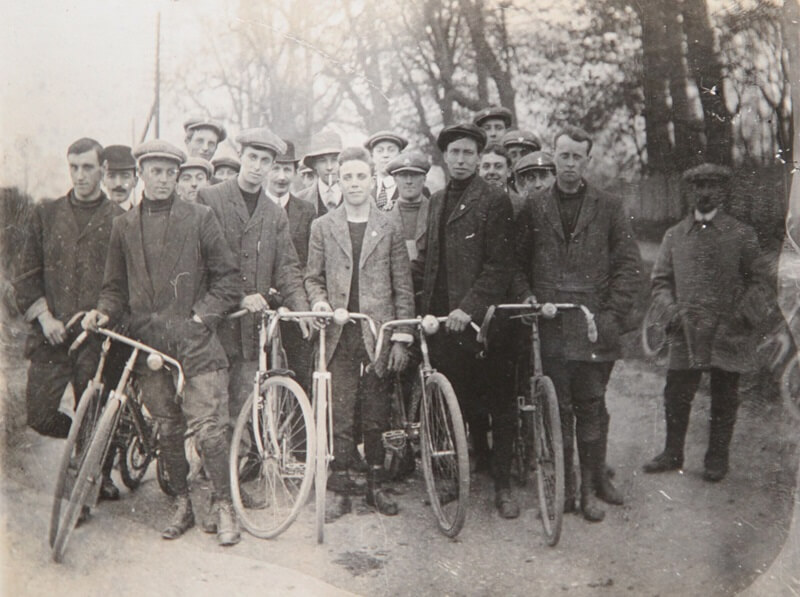
When Will left school at 13 or 14, he joined one of the Chesham wooden goods manufacturers as an apprentice. Will and his younger brothers were all 1st Chesham Bois Scouts.
Band of Brothers
With her four eldest sons all serving in the army, their mother must have been incredibly relieved when Armistice was declared before her youngest sons, Fred and Stanley came of age!
Alfred initially enlisted in the Kings Royal Rifles at Amersham and served there as Chief Bugler. However, he soon decided that this was not the best use of his talents and requested a transfer to the newly formed Royal Flying Corp. His engineering background led to him being enrolled as a mechanic and he was sent out to France.
Edward put his cycling skills to good use as a dispatch rider in the Signalling Company of the Royal Engineers. It was reported that Sergeant Palmer “believes that he has traversed almost all, if not quite all, the roads the armies in France and Belgium have covered and has had a nerve racking time. The last Mrs Palmer heard from him was that he was having a rest, and the cause was most prosaic: he has caught the measles – the German kind! – and is in hospital”.
Like, Will, who enlisted in the Rifle Brigade, the fourth son, Harry, enlisted as soon as he came of age in 1916. Pte Harry Palmer initially joined the Oxford and Bucks Light Infantry although he was with the Worcestershire Regiment when he was injured in April 1918, after receiving a bullet wound through his right hand. This was his second stay in the same French hospital after being gassed before. Will’s three brothers all returned safely back to Chesham Bois.
Prisoner of War
When Will was taken prisoner in June 1915, at Festubert on the Western Front, he became one of approximately 2.4 million men who became POWs in Germany during WWI. Initially he was sent to Hamburg, to a military hospital, Reserve Lazarett. Little is known about his experience as a prisoner of war after that and conditions varied across the different camps. Lower ranks certainly got the worse treatment and work camps could be brutal, especially for those under-fed prisoners sent to work in mines.
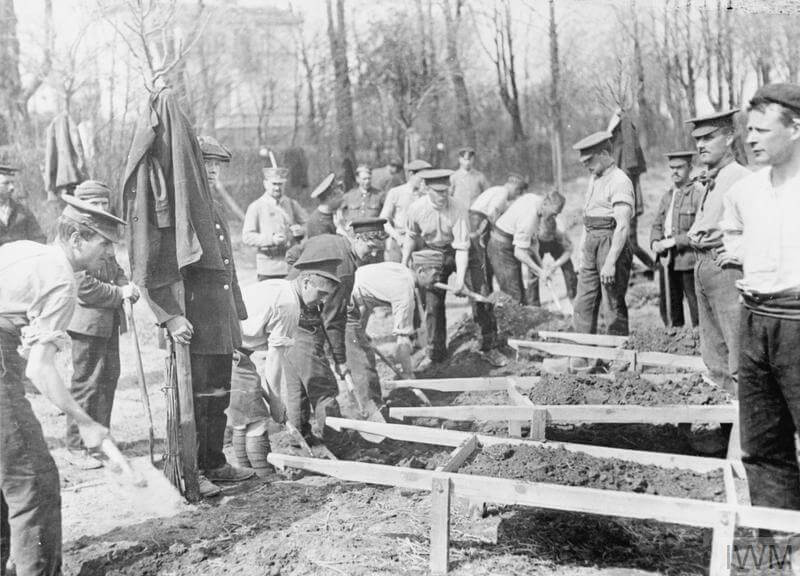
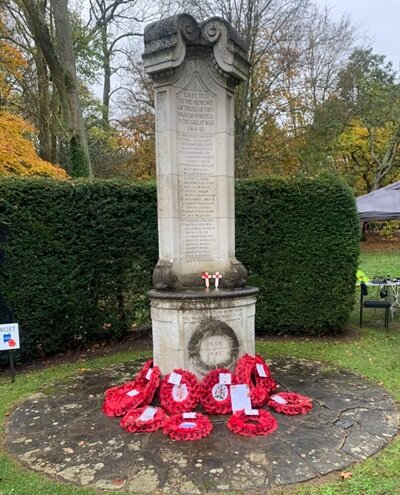
However, by 1918, Will, now 22, was living in Gadebusch, a small rural community outside Hamburg in northern Germany. Here he was working and appears to have been well-liked and cared for when he fell ill with Spanish Flu just weeks before the Armistice. After his death 8 November, his heartbroken parents received a letter from Germany “eloquent in its expression of sympathy and appreciation of the lad”. The letter was written by an Englishwoman living in the town, who saw Will most days driving a cart to the station. She described how popular Will was with his employer, Herr Jenz and his family, who kindly nursed him when he was ill. His funeral, with full military honours, was paid for by his employer. “I wish you could hear how Herr Jenz speaks of your son. He says he will never find another like him, so hardworking, and so trustworthy and dependable and exact. He says that they got on so well together and he evidently feels his death very much indeed. They spoke to each other with ‘Thou’ which is only done between relations and friends. I went in the afternoon to call on Herr Jenz to ask about the funeral and saw not him but his two daughters, they spoke of him, too, in the same way, with tears”.
Rifleman William John Palmer is buried in a Commonwealth War Grave in the Hamburg Cemetery and is commemorated on the Chesham Bois War Memorial and the 1st Chesham Bois Scouts Memorial in Pioneer Hall.
Sources
1st Chesham Bois Scouts
The Trail
British Newspaper Archive
Ancestry
In Memory of those men of Chesham Bois Parish who served and fell in the great war of 1914-1918 by Roger Cook

